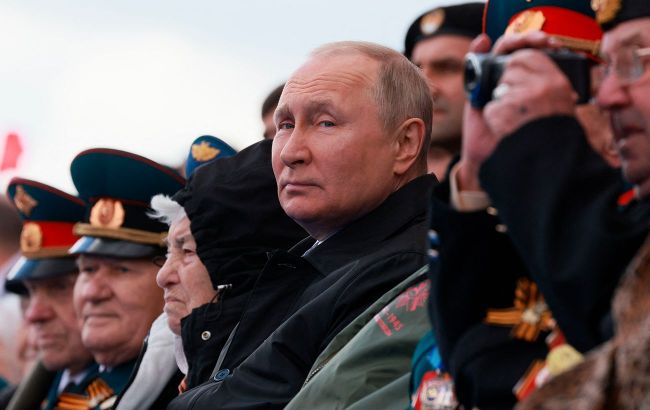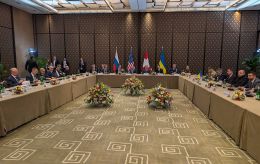How much longer can Russia wage war of attrition in Ukraine?
 Putin at a military parade in honor of Victory Day (photo: Getty Images)
Putin at a military parade in honor of Victory Day (photo: Getty Images)
Russia has decided to wage a war of attrition in Ukraine, actively restructuring its economy to this end. However, various transformations are taking place both within Russia and inside the Kremlin, and these changes are not in Putin's favor. Russian opposition figure Garry Kasparov discusses what Russia is doing to fight "for the long haul" and how the war's goals are shifting among the ruling elite in his column for RBC-Ukraine.
Russia is not only at war with Ukraine but with the entire free world. Ukraine today is simply the main front of this war. It seems to me that this war will continue, regardless of resources, as long as Putin remains in power. This is because the war against the free world is currently the only political, ideological, and even economic justification for the existence of Putin's Russia. There may be pauses and ceasefires in this war, but they are temporary. Recently, through Medvedev, Putin declared that this war is eternal—"either us or them."
Rational arguments will not necessarily play a decisive role in Putin's decision to continue or even intensify the fighting. However, there is a certain economic reality that indicates that Russian resources are far from limitless. While I treat any figures coming from Russia with great caution—because the statistics published there are incomplete or even false—the latest numbers that can be objectively verified indicate that serious negative shifts have begun in the Russian economy. Therefore, the active period of hostilities cannot continue indefinitely. This is why talks about peace have sharply intensified.
Overall, we are dealing with a large number of factors that are very difficult, if not impossible, to analyze. For example, Russia's ability to mobilize another half a million or even more soldiers. On one hand, the numbers suggest such a resource exists. But on the other, we see that Putin is very careful to avoid mobilization in Moscow and St. Petersburg. I believe that major cities are largely bypassed by active mobilization measures. There is some mobilization, and people are being touched. The focus is on prisoners, migrants, depressed regions, and national republics. Thus, Moscow and St. Petersburg do not yet truly feel the burden of war. But we are approaching the point where mobilization and recruitment for the military will affect these cities as well.
Additionally, we do not understand when sanctions will truly start creating holes in the Russian military machine. So far, Putin has managed to minimize their effect. However, the mechanisms for circumventing sanctions that have been implemented are quite effective, though they too have a finite effect. Most likely, this effect will also begin to wane by the end of this year. Therefore, it seems to me that the active campaign of "reconciliation" and peace talks is not accidental and is linked to an objective assessment that continuing the war into the next year without a clear perspective could start creating serious social and economic problems in Russia.
For Putin, negotiations are a way to solidify his conquests. Unfortunately, the level of Western support, primarily American, is insufficient to bring about a turning point in the war. This is also part of the problem we are dealing with. The West is not ready to provide Ukraine with the kind of assistance that would lead to a shift in the geopolitical balance—meaning a potential victory for Ukraine and, consequently, a defeat for Putin. A war in this mode inevitably ends in some sort of negotiation because Ukraine cannot win on its own without Western weapons and support, and the West will do it.
Moreover, the more than real prospect of Trump appearing in the White House in six months will also put pressure on both the Ukrainian leadership and European allies.
It seems to me that the active period of action that Russia is capable of is another 6-8 months. After that, the Kremlin will need to make decisions that will change the established algorithm. I think Putin will try to achieve significant success on the front in the next few months, to try then to secure a pause from a favorable position.
There is no faith in Putin's words about the conditions under which he considers the war to end. When he says something, he is most likely lying. All his statements about the war are generally made to conceal his plans. His plans for the destruction of Ukraine as a state and the assimilation of Ukrainians as a nation have not disappeared. Putin himself speaks about this cautiously, but his alter ego—Medvedev—does not hold back in these threats. As they say, what a sober man has on his mind, a drunk has on his tongue. Medvedev's statements should be taken as a true reflection of Putin's view on how the war should end. And these views do not leave room for Ukraine on the map.
The other issue is that they currently lack the resources to finish the war, so they have to look for some maneuvers. I think Putin will be ready to settle for even less than four regions if he gets the necessary respite and fixes the line of confrontation to continue preparing for war. Any fixation, even on today's line, means that Putin will start developing these territories.
By the way, it must be understood that there is no corruption as such in Russia. Because corruption implies there are at least some rules, Russia operates on the principle of feeding: there are budget flows that someone is mastering. Obviously, enormous sums will be allocated in Russia to develop the occupied "new territories." These will be strongholds built to prepare for a new war.
Therefore, today, based on political, economic, and intra-elite considerations, Putin would probably be satisfied with some agreement that would allow him to regroup. At the same time, he would try to ease the sanctions regime. But these are all temporary measures. If we center the word "war," then the war will continue in a more or less active mode as long as Putin is in power.
There are no people in Putin's entourage who are against the war because the war feeds them. The difference is that there are groups, one of which advocates continuing the war in the hottest possible version because it feeds on the money that goes into weapons and military equipment. The other group believes that it is necessary to consolidate success and start developing the territories because the money will go into building bases. The main contradiction among them is in the method of distributing funds. But there is no fundamental difference regarding Ukraine. Ukraine does not exist on the political map in Putin's Russia. They simply have questions about the methods of how to do this more easily. In my opinion, Putin is currently leaning more towards the second group, which seeks a more flexible way to continue the war through negotiations, through lowering the level of confrontation, to then buy time for regrouping and weakening the sanctions regime.
Translated by Daria Dmytriieva

